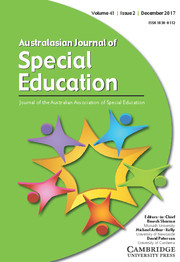Article contents
Some Ethical Problems in Special Education
Published online by Cambridge University Press: 26 February 2016
Abstract
This paper examines, from a philosophical perspective, some of the main ethical problems pertaining to the special education field. It is argued that while special education practice has been strongly grounded in psychological theory, it has not always been adequately justified by reference to general moral principles. Rationales for intervention are mostly couched in descriptive or explanatory terms while the over-riding prescriptive or evaluative dimensions are often presupposed without explicit justification. Particular issues such as diagnostic assessment, educational placement and behavioural management can be seen to entail complex ethical problems concerning the consideration of individual rights and interests, equality of educational opportunity, and respect for personal autonomy. Examples of the moral dilemmas inherent in particular special educational practices are examined. Finally, it is claimed that special educators must be able to defend not only the empirical bases of their educational theories, but also the value judgments implicit in them.
- Type
- Research and Review
- Information
- Copyright
- Copyright © The Australian Association of Special Education 1982
References
- 1
- Cited by


